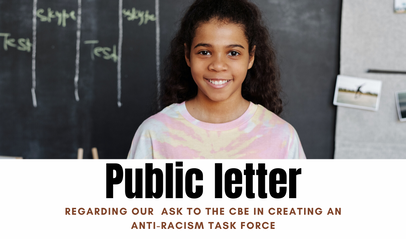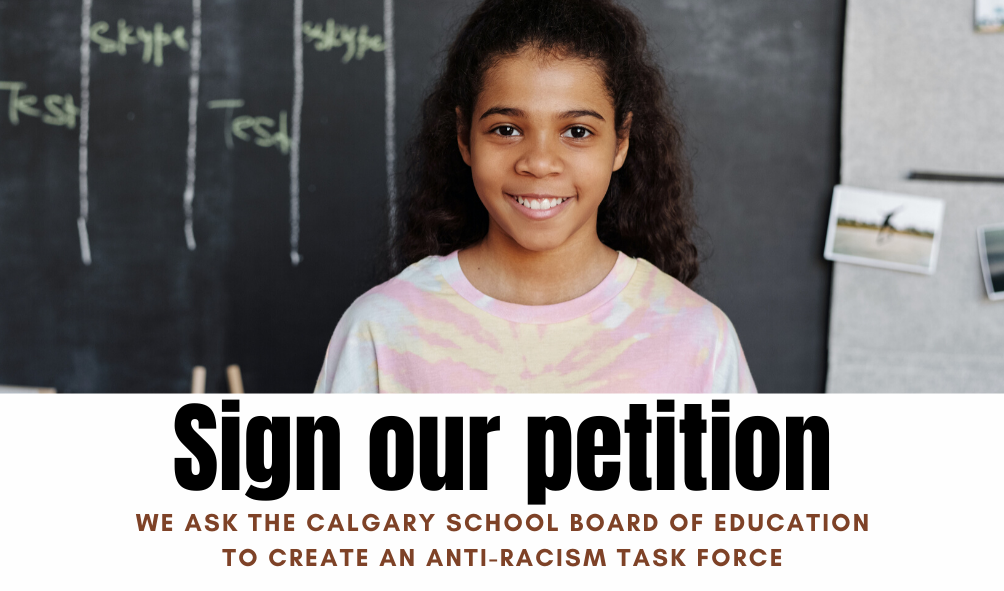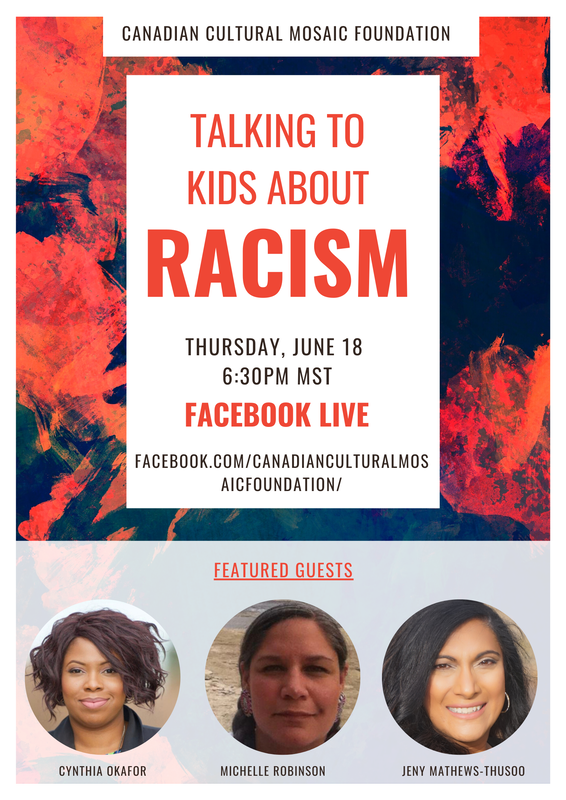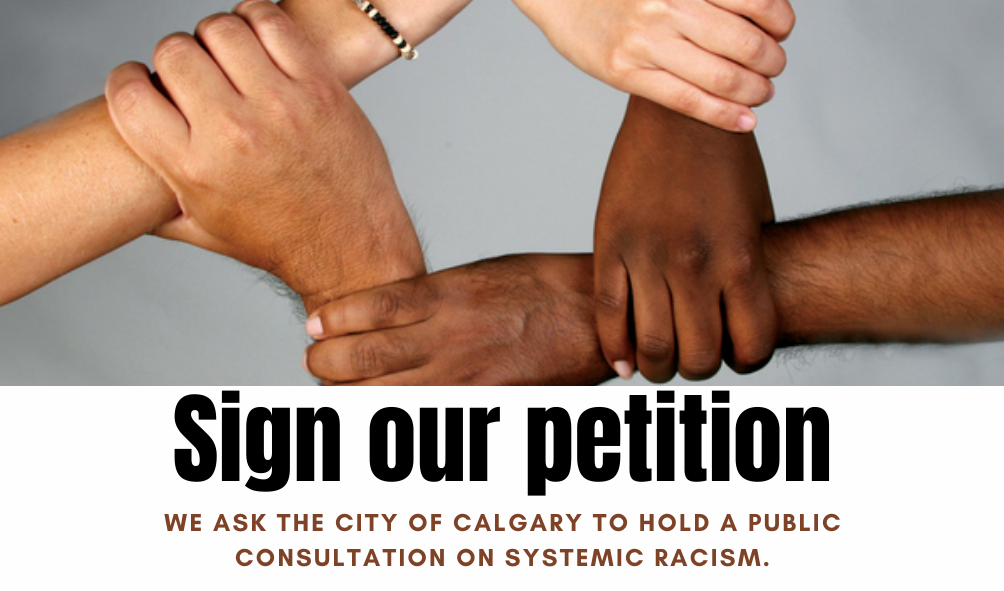City of Calgary's Systemic Racism Public Consultation, What to Expect, Some Ideas and More6/29/2020
As part of Calgary’s commitment to anti-racism, The City of Calgary is holding a public consultation on systemic racism through a meeting of the Standing Policy Committee on Community and Protective Services which is scheduled to start on July 7 and 8, 2020.
How to register to present at the meeting: Registration is now over. Thank you for registering. How to view the agenda: Here it is. How to speak to the City Council committee: Here is a document to help you prepare for speaking to City Council. How to listen in, but not present: We recommend all Calgarians to watch the council meeting live on the day of. Sharing experiences of racism can be a really difficult and scary thing to do. Here are some tips that might help you stay grounded and present as you speak:
5 Comments
 To my fellow Calgarians, My name is Courtney Walcott. I am a public high school teacher in Calgary. In collaboration with the Canadian Cultural Mosaic Foundation (CCMF), we started a petition on June 19, 2020, to ask the Calgary Board of Education (CBE) to create an Anti-Racism Task Force. In just a few days, we amassed over 7,000 signatures. The petition was featured on CBC News, Global News, Red FM and others. The success of this petition is due, in no small part, to the efforts and commitment of CCMF. They continue to strive for change in the education system through anti-racism work. CCMF released a study last year that illustrated Alberta teachers’ awareness of racism in their schools and the lack of tools to address it in their classrooms. Teachers indicated that they were fundamentally unprepared to create an inclusive curriculum due to a shortage of available resources. Six days after we released the petition, the CBE committed to doing the work necessary to create an equitable and anti-racist environment in schools, and created a Collaboration for Anti-Racism and Equity Support Advisory Council (CBE C.A.R.E.S.). This is a great first step — as long as the commitment is followed with action. And the teachers, students, parents and citizens who signed the petition have demanded that action in the form of accountable, data-driven and immediate change. While every call to action in our petition has not yet been satisfied — race-based data collection is required to effectively analyze and address systemic racism in our institutions — we have faith that the CBE will follow through on their promise to stakeholders. Thank you to everyone for adding their voice to this cause by signing and sharing the petition. While the petition is officially closing, we will continue to hold our institutions accountable for dismantling systemic racism. If you would like to get involved, the City of Calgary is holding a public forum on systemic racism on Tuesday, July 7, 2020 at 9:30 a.m., thanks to the hard work and determination of CCMF. Please share this information with your family and friends who have experienced racism so we can ensure their voices are heard and appropriate policy changes can be recommended. Follow CCMF on social media for further details on how you or your loved ones can participate: Facebook: @canadianculturalmosaicfoundation Twitter: @CanadianCMF Instagram: @canadiancmf Thank you, Courtney Walcott and the Canadian Cultural Mosaic Foundation
Historically, the education system has been used as a tool to propagate discriminatory and prejudiced ideologies. It is well known that the ideologies and policies of the past were based on discriminatory schools of thought regarding the differences between race, gender, and class. With this as a guiding understanding, we seek to put together a task force to specifically analyze which aspects of public-school policy continue to adversely impact our minority students. The foundation of this task force will be through the collection and analysis of race-based, gender-based, and economic-based data to determine and isolate problematic structures within the public education system. It will only be through the analysis of the policies in place, the history of their creation, and the impact on minority groups within this system that meaningful change can be made.
The task force will also look at methods of building school culture and developing the necessary school-based resources to impact the ongoing learning of students and staff. This includes, but is not limited to, the development of school-based equity committees, the ongoing process of learning about and the deconstruction of implicit bias, and the development of professional learning programs that can be facilitated to all CBE staff on the subject of anti-discriminatory work, as well as locally develop an anti-discrimination course, and a review of the K-12 Alberta curriculum to address necessary changes to reflect the diversity of the Alberta student body. Overall Strategy: To coordinate and strengthen anti-discriminatory work through data collection, analysis, and policy creation in accordance with the aim of disrupting systemic prejudice and discrimination. Goals
1. Build a comprehensive data set based on race, gender, and economic status.
4. An analysis of curriculum programs and the impact they have on student success
6. An analysis of course enrolment based on race, gender, and economic class in an effort to identify trends and possible systemic limitations to our distribution of equitable opportunities. 7. Research the origins of current educational practices to develop a historical analysis of potential discriminatory policies that may remain in our current system. 8. Analyze trends in hiring practices to identify potential bias in the hiring process Potential Task Force Members The task force would ideally be a combination of educators, policy makers, and analysts from the community. Potential collaborative opportunities exist through partnerships with our local Universities (Mount Royal University, University of Calgary) through their Public Policy, Education, History, and Sociology faculties and student base. This task force would need to be dedicated, and not run as a secondary duty of employees from the Calgary Board of Education. To complete this work in a timely, organized, comprehensive, and effective manner, this task force should be the sole focus of its members during its initial run. Too often is this the work of a committee meeting once a week for a year, yielding nothing. This work is challenging. It is disruptive. However, at its core, it is the work that will have long term effects that align with the goal of public education. Public education has the rare power to direct society towards a better future. This power cannot be taken for granted in light of daunting circumstances. Sacrifices and investments must be made into developing our future. Until we seek to understand the problem, we will never truly be able to fix it. We must do this work. Media contact/inquiries: Courtney Walcott, Social Studies & English Language Arts Teacher Western Canada High School [email protected]
June 10, 2020
His Worship Mayor Naheed Nenshi and The City of Calgary Councillors, The City of Calgary is home to an ethnically diverse population. According to Statistics Canada, in 2016, over 30 per cent of our population identified as a visible minority and about three per cent as Aboriginal. However, racist incidents, crimes, and constraints continue across the city. The City of Calgary municipal government has created a few policies and strategies to promote diversity and inclusion, but our great city needs concrete and ongoing anti-racism action. We want to help the City in coming up with solutions. The Canadian Cultural Mosaic Foundation (CCMF) has created a petition asking the City to hold a public consultation on systemic racism and discrimination. Within a week, the petition has amassed close to 70,000 signatures. We have also seen thousands of Calgarians rally in peaceful protests for Black Lives Matter and racial justice to show a societal fatigue of certain systemic occurrences and widespread desire to eradicate or improve conditions for Indigenous and racialized citizens, even during a pandemic. This consultation will allow Calgarians of all backgrounds to participate in the development of concrete solutions to improve the economic, social, cultural and political conditions of Calgary residents, particularly members of Indigenous and racialized communities. Calgary is a great city but we have the chance to build an even better one that is more inclusive, equitable and prosperous. CCMF is a not-for-profit organization of volunteers working to improve race relations in Calgary and Canada. We utilize education, technology and arts to create cultural understanding and mitigate racism. Being on the forefront of anti-racism advocacy and multiculturalism, our foundation often works with ethnic communities on projects. We implore the City of Calgary to hold a public consultation on systemic racism and discrimination and be part of this important movement. Our recommendations for the public consultation are as follows:
We want a city that is proactive, instead of reactive. While there are no magic or quick solutions to addressing systemic racism, we are confident that holding this public consultation will provide much-needed guidance to inform next steps on how the The City can play an active and vital role in improving life for all Calgarians. Thank you for your consideration and our organization would be happy to support this initiative in any way you need. Sincerely, Canadian Cultural Mosaic Foundation The City of Calgary is home to an ethnically diverse population. According to Statistics Canada, in 2016 over 30% of its population identified as a visible minority and about 3% as Aboriginal . However racist incidents and crimes continue across the city. The municipal government, The City of Calgary, has yet to tackle the discrimination that these population face. We understand The City has created a few policies and strategies to promote diversity and inclusion, but there is no concrete action taken. We want to help The City in coming up with solutions.
Please sign this petition to be part of the movement to tackle systemic racism and discrimination in Calgary. We ask The City to hold a public consultation on systemic racism and discrimination. This consultation will allow Calgarians of all backgrounds to participate in the development of concrete solutions to improve economic, social, cultural, and political conditions of Calgary residents, particularly members of Indigenous and racialized communities, and build a more inclusive equitable and prosperous city. Please sign and share! We get a lot of folks wanting to learn more about racism, but want to make sure the resource is legitimate and easy to understand. We have also seen a trend of shaming others for not knowing. We do not believe this is the way to creating positive changes. Here are some common terms to help you understand and become an ally. We use these definitions in our school presentations so they are easy to understand!
Race Before you understand racism, you need to understand race. But what is race? We sometimes hear people say race is a social construct, but what does that mean? ► Race has no basis in biological reality, therefore has no meaning independent of its social definitions. There is no gene or cluster of genes common to all blacks or all whites. Were race “real” in the genetic sense, racial classifications for individuals would remain constant across boundaries. Yet, a person who could be categorized as black in the United States might be considered white in Brazil or coloured in South Africa ►Although race is socially constructed, it significantly affects the lives of people of colour and Indigenous people, particularly in the West. ►The concept of race was created to establish a hierarchy in society. Here is a great video that further explains this. Racism We often hear politicians say racism is about ignorance. But it's not just about social attitudes. Instead racism is: ►A system in which one group of people exercises power over another on the basis of race. ►A set of beliefs, false assumptions, and actions based on an ideology of the inherent superiority of one racial group over another. ►Consists of policies and practices, rooted in established institutions, that result in the exclusion or advancement of specific groups of people. Ex - discriminatory laws, residential segregation, poor health care, inferior education, unequal economic opportunity and the exclusion and distortion of the perspectives of non-dominant Canadians. Racial Discrimination This is a term we don't hear very often. But it's incredibly important. And even more so, it's important to understand the difference between racism and racial discrimination: ►Racial discrimination can happen to anyone who is discriminated against based on their race and is usually an individual act. Racism is more persistent as it is not only an individual behaviour or act, but a way of thinking and is institutionalized/inherent in Canada. ►In Canada, anyone can experience racial discrimination but only people of colour and Indigenous people can experience racism. Privilege We hear the word privilege be thrown around often, especially white privilege, but many people don't understand how they themselves are privileged. ►Refers to gaining benefits, advantages, and rights by default at the expense of others, because one belongs to the perceived “us,” “normal” or “natural” state of the “mainstream” and/or dominant culture. ►Privilege is not visible to its holder; it is merely there, a part of the world, a way of life, simply the way things are. Here is a great exercise that explains white privilege. Microaggression Microaggression is a term used for brief and commonplace daily verbal, behavioural, or environmental indignities, whether intentional or unintentional, that communicate hostile, derogatory, or negative prejudicial slights and insults toward any group, particularly culturally marginalized groups. Here is a comic book we made about daily racial microaggressions. As well, here is a great video that further explains microaggressions. Bias Do you know we all have bias? We create them from a young age to navigate the world. But what is a bias? ►A subjective opinion, preference, prejudice or inclination, often formed without reasonable justification, that influences an individual’s or group’s ability to evaluate a particular situation objectively or accurately. ►You can be aware or unaware of it. Here is a great video on racial bias (note: there is a swear word in it, used once) Stereotypes and Generalizations We've heard many growing up, whether they are positive or negative, they contribute to a dysfunctional class system. ►A preconceived overgeneralization of a group of people, ascribing the same characteristics to all members of the group, regardless of their individual differences. ►Most of us fit into different categories and have a variety of interests. We might like watching sports but be non-athletic. We might like rap as well as classical music. But when we think about other people, particularly people who are a different race from us, we often have a harder time understanding that complexity. So we put people into categories and thus – stereotypes are formed. Intersectionality This term is thrown around a lot. It's essentially how oppressive systems are linked together ►The experience of the interconnected nature of identities, and the way they are embedded within existing systems such that they define how one is valued. ►In other words, the interconnected nature of all forms of oppression against particular groups. Now that you are aware of all this, how can you be an ally? It's important to understand the difference between and Ally and an Advocate. An Advocate: ►Supporting a cause that directly relates to you or affects you. ►Speaks out and takes action for change. An Ally: ►Listens, supports and advocates, but is not in the spotlight or the loudest voice. Stands with and not in front of. ►How to be an ally: ■Understand your privilege ■Listen and do your homework ■Speak up, not over ■Apologize when you make mistakes ■Ally is a VERB Want to learn more about racism?
|
Archives
January 2024
|



 RSS Feed
RSS Feed
